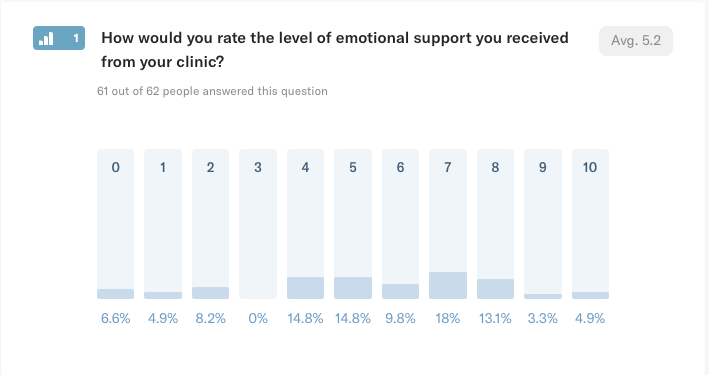Patient Feedback On The Emotional Support They Received In Their Clinic

Fertility Fest 2019
May 6, 2019
Feeling Overwhelmed
June 26, 2019I have been running a survey in my support community on the emotional support they have received in their clinic. I want to find out what IVF patients really need in terms of support and whether they are getting it.
The responses have been really insightful and are helping me build up a deeper understanding of how patients would like their clinics to support them.
The following quotes are all genuine feedback from patients all over the UK.
I asked respondents whether their clinic had a culture of support that was followed by all members of staff.
Current results showed:
60% said No
40% said Yes
I asked the respondents to elaborate on their response, and these were some of the responses:
Examples of when support is done well
"My nurse Helen, she was AMAZING, really down to earth yet always professional, always there for a chat on the end of the phone or in person & there to explain the procedure and check that my emotional well-being is on tip top form before the IVF procedure."
“Talking to me as a human rather than a ‘patient’ - being upfront and honest and breaking down technical terms so that It’s comprehendible and the personal support”
“They were amazing when we had a miscarriage, gave us a hug, private room, information, listened to us, gave us space and arranged for surgery 16 hours later (last working day before Christmas). Their efficiency made the process much easier.”
“Little details like our main nurse remembered our names each time. They held hope with us and when our cycle failed they were genuinely sad with us. Always prepared to speak on the phone when we had worries or questions”
"A couple of the nurses are amazing - we are like old timers at the clinic and we feel like we know them now, always judge it right - jolly and cheering you on at the right times and also empathy at the difficult times. Our consultant is not a great communicator but when he called us to say he was sorry the last transfer hadn’t worked - that meant a lot as everything with him had been so transactional up to that point."
"I found some nurses to be supportive and sympathetic. Perhaps staff can be trained in how to understand what patients are going through both physically and mentally."
"Our consultant has been amazingly supportive during this journey. He has always been available to ask questions, has done my last few egg collections, offered to do embryo transfers, was really happy when we were pregnant, gave us a huge hug after our first scan. Supported us and checked up on us after our miscarriage and rang me with the results of the genetic testing."
"In my particular clinic I found the nursing team who do initial appointments and scans until egg collection just overall not very caring. The egg collection team there and embryologists were totally different, very caring, explained everything step by step and they were the only reason we have gone back to the same clinic."
It's great see such positive feedback about emotional support in clinics, it highlights that when it is done right it makes a big difference to the experience of patients and helps them feel comfortable in returning for further treatment.
The main thing that patients appreciate is being treated as a person rather than a number, that bad news is delivered empathically and that staff show they understand how patients are feeling and truly care about them.
My updated survey results show that the average rating respondents give their clinic for emotional support is 5.2, so there is still more that can be done.
Emotional support should be seen as equally important to clinics as medical support, and when it is done well it stands out, makes the patient feel important and will lead to a better experience and emotional wellbeing for the patient.

Unfortunately, there are still examples where support is lacking, and there is an opportunity to increase the support.
Again the comments that are less positive relate to the fact that staff were not always empathic towards them, that they didn't seem to understand how they were feeling and they felt like a number.
In particular, respondents feel that the consultants are great on the medical side, but not always as empathic as they would like and need.
It shows that it is the responsibility of all staff to provide emotional support to patients so that they are supported at all times and all points of contact with the clinic.
Examples of Where More Support Could Be Provided
"It is hard to criticise the unit as it is only small and they all do their jobs well, however, in terms of emotional support it is lacking. I suppose this just comes down to the fact that they are there to do a job, e.g. scans, blood tests etc. They aren't there to listen to any worries or concerns and in fairness they point you in the direction of the support group if you do need emotional support."
"There was one senior nurse who was total opposite to all the others, she was so cold and harsh when telling us that our pregnancy wasn’t going to continue- we complained about her at the time, as she said she prefers to tell people straight, as it is!!! Not sympathetic."
"Individual staff have been brilliant but others just don’t have that empathy and sensitivity, I know a lot of it is the nature of the person etc, but some Drs and Nurses are pretty blunt without thought to how that person is feeling to receive that news."
"Just found our consultant has a very unsympathetic attitude, looks bored/tired when you walk in, has trainees but only asks you if ok as you walk in. Some nurses lovely, others very unorganised, not very sympathetic."
"One or two of the nurses were great, but others I felt were very clinical and at times patronising. The same with consultants, one we had made us feel like we were asking stupid questions and just talked in a complicated very scientific way."
"As stated above the nurses i saw were very good at offering emotional support. it was the lead consultant who i dreaded seeing. he made me totally uneasy and the way he told me i may never have children dramatically affected my mental health and well-being."
"They were all pretty clinical and we just felt like a number yet this was the most important thing in the world to us as it was the difference between being a couple and being a family."
Clinics need to recognise that if they are supporting patients in every communication they have with them, those patients will feel more valued, feel more trusting of the clinic, cope better through treatment and return to them for further treatment. They need to develop a ‘Culture of Support’.
I will continue to share the results as the number of recipients grows.



